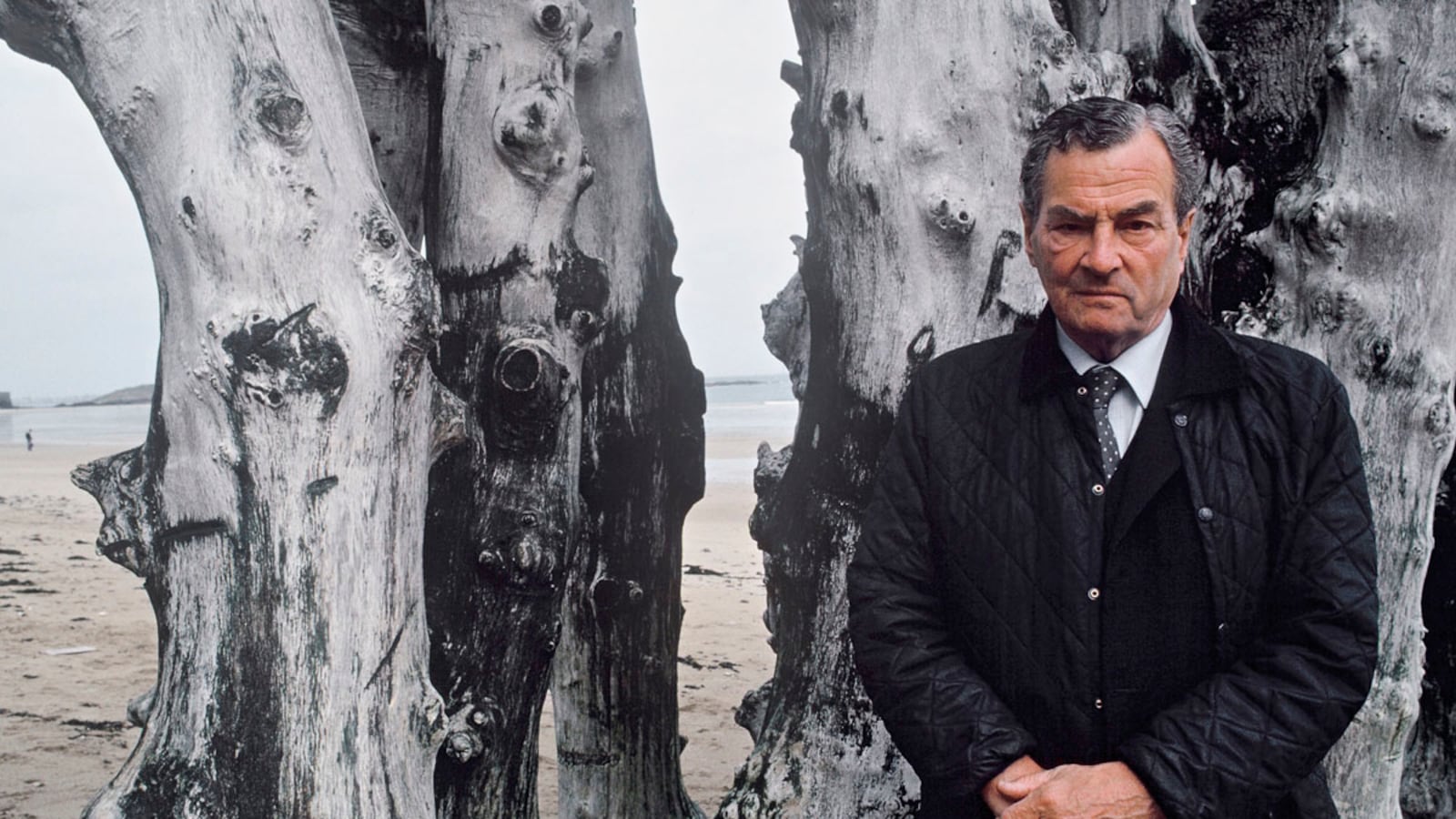They buried Patrick Leigh Fermor in the soft green turf of a Cotswold graveyard on a cloudy Thursday afternoon.
In the church, a wonderfully abstruse reading from the Restoration mystic Sir Thomas Browne was read out by Paddy’s friend and executor, the travel writer Colin Thubron: “But the Quincunx of Heaven runs low,” he intoned, “and 'tis time to close the five ports of knowledge; we are unwilling to spin out our awaking thoughts into the phantasmes of sleep, which often continueth præcogitations; making Cables of Cobwebbes and Wildernesses of handsome Groves."
As the Union flag-covered bier was carried to the grave from the church, a piper sounded the Scottish lament, The Flowers of the Forest; then the wooden casket was slowly lowered into the grave-cut by six grey-haired, bent-backed soldiers. As it went down you could see it sink through the stratigraphy of the village soil with the white of the bones of mediaeval or Tudor villagers visible against the brown of the grave clod. The Last Post was played by an Irish Guards officer in a redcoat and bearskin and the small group of black-clad largely elderly mourners took a last look then turned away.
The mix of literary and military is not very common: skill with the sword usually precludes much competence with the pen. For all that Sir Philip Sidney could write sequences of Petrachan sonnets as well as lead buccaneering raids on the Spanish Netherlands, or Siegfried Sassoon write his great anti-War memoirs while also winning the Military Cross, bookishness and military machismo are rarely found roosting together. After all, it’s no secret, as the old joke goes, that Military Intelligence is usually a contradiction in terms.
The great exception to this rule in our own time amongst British writers was Patrick Leigh Fermor. For although Leigh Fermor was one of the finest prose stylists in English and one the greatest travel writers of the twentieth century, he was also responsible for one of the most audacious Special Operations coups of World War II. Fermor’s own account of the abduction of General Kreipe, the German commander of the Nazi occupation forces in Crete, is published in Artemis Cooper’s wonderful anthology of Leigh Fermor’s work, Words of Mercury. In the film version, entitled Ill Met by Moonlight, Paddy was played by the dashing Dirk Bogarde. But in Leigh Fermor’s own account, the climax comes not as the General’s staff car is stopped at night by a British SOE party dressed in stolen German uniforms, nor as the Cretan partisans help smuggle the General into the Cretan highlands and hence to a waiting British submarine; but instead as “a brilliant dawn was breaking over the crest of Mount Ida”:

“We were all three lying smoking in silence, when the General, half to himself, slowly said: ‘Vides ut alta stet nive candidum Soracte’
“It was the opening lines of one of the few Horace odes I knew by heart. I went on reciting where he had broken off… The General’s blue eyes swivelled away from the mountain-top to mine- and when I’d finished, after a long silence, he said: ‘Ach so, Herr Major!’ It was very strange. ‘Ja, Herr General.’ As though for a moment, the war had ceased to exist. We had both drunk at the same fountains long before; and things were different between us for the rest of our time together.”
It is an archetypal Leigh Fermor anecdote: beautifully written, fabulously romantic and just a little showy. For Leigh Fermor’s greatest virtues as a writer are also his greatest vices: his incantational love of great waterfalls of words, combined with the wild scholarly enthusiasms of a brilliant autodidact. On the rare occasions he gets it wrong, Paddy has been responsible for some of the most brightly coloured purple passages in travel literature. But at his best he is sublime, unbeatable. Of late, the world of literary travel writing, once associated with the drumbeat of hooves across some distant steppe, has begun echoing instead with the slow tread of the undertaker’s muffled footfall. Within the last few years, Wilfred Thesiger and Norman Lewis, Ryszard Kapuscinski, Eric Newby, Nicolas Bouvier, and Bruce Chatwin have like Paddy set out on their last journey; but Leigh Fermor was for me the greatest of them all.
For as well as being a war hero, one of the world’s great long distance walkers, and as tough a traveller as you could find, Leigh Fermor has always been a writer of great intelligence, sensitivity and profundity. Here he is, for example, describing a French Cistercian monastery where he says he discovered:
“The capacity for solitude and the recollectedness and clarity of spirit that accompany the silent monastic life. For in the seclusion of a cell—an existence whose quietness is only varied by the silent meals, the solemnity of ritual and long solitary walks in the woods—the troubled waters of the mind grow still and clear, and much that is hidden away and all that clouds it floats to the surface and can be skimmed away; and after a time one reaches a state of peace that is unthought of in the ordinary world.”
While his densely literary prose style is beyond imitation, his books have become sacred texts for several generations of British writers of non-fiction including Thubron, Chatwin and Rory Stewart, all of whom have been inspired by the persona he created of the bookish wanderer: the footloose scholar in the wilds, scrambling through remote mountains, a knapsack full of good books on his shoulder. As Anthony Lane put it in the New Yorker, Paddy
“was, and remains, an Englishman, with so much living to his credit that the lives conducted by the rest of us seem barely sentient pinched and paltry things, laughably provincial in their scope... We fret about our kids' S.A.Ts, whereas this man, when he was barely more than a kid himself walked from Rotterdam to Istanbul. In his sixties, he swam the Hellespont, in homage to Lord Byron—his hero, and to some extent, his template. In between, he has joined a cavalry charge, observed a voodoo ceremony in Haiti, and plunged into a love affair with a princess. He has feasted atop a moonlit tower, with wine and roast lamb hauled up by rope. He has dwelled soundlessly among Trappist monks.”
For myself, it was the reading of his travel books while at Cambridge that inspired me to attempt to follow in his footsteps. With a paperback of Paddy’s in my backpack, I set off to Jerusalem following the route of the Crusaders during my first summer vacation. Meeting my hero for the first time at Bruce Chatwin’s house just before the publication of my first book in 1989 was the nearest thing I have had to a formal graduation ceremony as a writer, the moment when you suddenly feel that maybe you really have passed out of your noviciate.
Foremost among Paddy’s books are his two glorious Greek travelogues, Mani and Roumeli; his exquisite short study of monasticism, A Time to Keep Silence; and most celebrated of all, an account of his journey in the early Thirties, travelling on foot, sleeping in hayricks and castles “like a tramp, a pilgrim, or a wandering scholar,” from Holland to Constantinople. On and off for nearly seventy years Fermor has been working on a trilogy about this epic walk. The first volume—and many would say his masterpiece—A Time of Gifts was finally published in 1977. The second Between the Woods and the Water, followed nine years later. Volume three, the book which should take us to the gates of Byzantium, was still unfinished at his death, though an early draft is extant.
Most of these books were written in Paddy’s beautiful house at Kardamyli deep in Mani, at the tip of the Greek Peloponnese. It is the most perfect writer’s house imaginable, designed and partially built by Paddy himself in an old olive grove overlooking a secluded Mediterranean bay. Buttressed by the old retaining walls of the olive terraces, the white-washed rooms are cool and airy and lined with books; old copies of the TLS and the NYRB lie scattered around on tables between Attic vases, Indian sculptures, and bottles of local ouzo. A study filled with reference books and old photographs lies across a shady courtyard filled with olive trees. There are cicadas grinding in the cypresses, and a wonderful view of the peaks of the Taygetus falling down to the blue waters of the Aegean, so clear that it is said that in some places you can still see the wrecks of old Ottoman galleys lying on the sea bed far below. There is a warm smell of wild rosemary and cypress resin in the air; and from below comes the crash of the sea on the pebbles of the foreshore.
On my last visit a couple of years ago I went with Paddy to see the Byzantine chapel around which his friend Bruce Chatwin—the man who first introduced me to Paddy nearly twenty years ago—had had his ashes scattered.
The chapel was very small—only a little larger than a big garden shed. It had a domed, red-tiled roof and round arcaded windows. It lay in the rocky fields near the village of Exchori, high above Kardamyli, and was built from stone the colour of haloumi cheese.
The sun was now slowly sinking over the hills at the end of a hot day; from the higher slopes, the tinkle of goat bells cut through the drowsy background whirr of cicadas as shepherd children led their flocks back for the night. It was perfect, beautiful, peaceful place for anyone to end their days, and as we headed back I asked Paddy whether he would like to be buried there too.
“Oh no,” he replied instantly. “My wife Joan is in Dumbleton. I’d rather like to end up there.”
It’s a characteristic of so many of the greatest English travellers that they come back home in the end. TE Lawrence, for example, finally recognised “that I could not sincerely take on the Arab skin,” and the same is true of Paddy. For all his years in Greece, he remained almost the archetypal Englishman, in its best possible form: “My heart is in both,” he said as we headed downhill. “England is not a foreign country to me.”
Two months ago, Paddy was diagnosed with throat cancer and an emergency operation in Athens removed the tumour, but left the 96 year-old very week. Realising the end was near, he asked to be flown back to England. He made it back to Dumbleton, and died the following morning. He now lies beside Joan, as he wished. With him, goes the last of a great generation. For his many admirers, its marks the end of an era.






